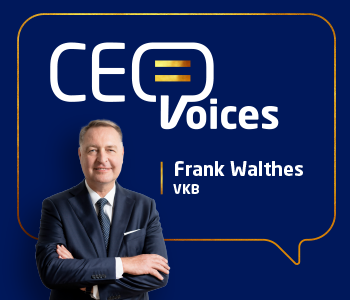“Insurance is going to be uniquely impacted by Generative AI. ”
Andrew Horton
Since Andrew Horton joined QBE in September 2021 the insurer has followed a path of organisational and infrastructural modernisation. Before moving to QBE, Horton was the CEO for Beazley for 12 years, and was at the company for 18 years. He has also worked at Lloyds Bank, ING and NatWest.
He has more than 30 years' experience across insurance and banking, and has been characterised as an inclusive and collaborative executive, who places a strong focus on risk, culture and relationships.


About QBE
Sydney based QBE Insurance Group is among the world's biggest insurance companies with operations in the US, UK, Australia, and 23 more countries. Since 2021, QBE has built greater consistency and resilience across its business. Investing in new technology has become a fundamental part of its strategy. The insurer is advancing the use of Al to drive greater efficiency.
Summary
The insurance industry is facing fundamental change, says Andrew Horton. This is being triggered by external factors such as rising customer expectations, challenges posed by a changing climate and rapidly evolving technologies. Horton is convinced that generative Al and the increasing power of cloud computing will reshape the industry, including QBE. Insurers will increasingly become partners in risk prevention and mitigation for their customers, he says.
Interview by Michał Trochimczuk, President of Sollers Consulting with Andrew Horton, Group CEO of QBE
Michał Trochimczuk: Last 25 years: What have been the most important technological developments for the insurance industry in the last 25 years and what significance have they had for QBE's business?
Andrew Horton: Insurance has been built on deep insights-understanding the world around us and the challenges our customers face. Traditionally, insurance has served as the final line of defence against unforeseen events. However, the explosion of data, advancements in artificial intelligence- particularly Generative Al-and the increasing power of cloud computing are fundamentally reshaping both the industry and QBE. When implemented effectively, these technologies enhance our ability to respond to customers and brokers with greater speed and accuracy. They strengthen our underwriting insight, improve risk management, and drive overall performance. Cloud-operated insurance lifecycle platforms-spanning policy and claims management-have lowered operational costs, reduced reliance on legacy technology, and allowed organisations like QBE to stay connected to emerging capabilities without the burden of maintaining on-premise infrastructure. For QBE, the significance of these advancements include increased flexibility, faster innovation cycles, and long-term efficiency.
Michał Trochimczuk: Current challenges: The world is currently facing numerous geopolitical, economic and environmental challenges. Which do you consider to be the most important from QBE's perspective? How are you tackling them?
Andrew Horton: The world is navigating an era of heightened uncertainty which has considerations and implications for the insurance industry and our customers. We anticipate continued challenges in an evolving global landscape, including inflationary pressures, security concerns across multiple regions, environmental risks and broader economic uncertainty. Our purpose of enabling a more resilient future remains a guiding force. Emerging data capabilities
--particularly in weather risk, cyber risk, and emerging risks in workers' compensation-are enabling QBE to continuously evolve our products in response to a rapidly changing risk landscape. Large-scale data systems across these verticals allows us to partner with our customers, particularly in risk solutions, to help our customers understand their risk environment and continue to be insurable. For example, QBE's investments in Geosite and Tensorflight, have enabled us to be more responsive to customer claims in major catastrophic events such as tropical cyclones.
“The explosion of data, advancements in artificial intelligence and the increasing power of cloud computing are fundamentally reshaping the industry.”
Michał Trochimczuk: Next 25 years: What changes will have the greatest impact on the insurance industry in the future? What changes do you expect for QBE's business specifically?
Andrew Horton: Over the next 25 years, emerging technologies, shifting climate and weather patterns, and changing customer expectations will fundamentally reshape the insurance industry. Insurance is going to be uniquely impacted by Generative Al, as it can work with highly complex information in many formats, with the potential to provide efficiency gains the market and customers would like to see from insurance. This is happening at the same time as we have more insight from real-time data and connected systems. We expect to see more risk-led, data informed practices and a greater need for QBE to deliver more innovative solutions, services and insurance products that customers will need. We are appropriately investing in Al capabilities to modernise in a way that aligns with QBE's long-term vision. Our execution is focused on the key challenges or opportunities for the business, which helps us operate at pace, while staying within the right guardrails for QBE. We see insurers becoming more like risk prevention and mitigation partners to customers.
Michał Trochimczuk: What are the key areas of innovation in technology and beyond that QBE is currently focusing on? What role will technological developments such as Al, IoT,quantum computers, etc. play?
Andrew Horton:QBE continues to invest in digital, cloud and Al capabilities to modernise the core business while deliberately exploring new growth areas. Our focus is on leveraging Al and advanced analytics to improve risk assessment, underwriting and portfolio performance and claims and service outcomes for customers, and to improve risk models to ensure our products remain market leading. Al powered tools are already improving underwriting decision-making speed and accuracy, with QBE's first at scale deployment for Cyber Underwriting receiving industry recognition. Our view is that loT and sensor-driven solutions help clients actively prevent losses, particularly in people-risk. Quantum computing remains exploratory but holds potential for revolutionary risk analytics and better equipping customers in key moments, for example in high-risk data protection.
Michał Trochimczuk: QBE works with various InsurTechs through its venture capital arm QBE Ventures. How do you see the role of InsurTech partnerships in the coming years and which areas of innovation are the most exciting for QBE?
Andrew Horton: lnsurTech partnerships through QBE Ventures are vital to our innovation strategy to modernise the core business and support a growth agenda in emerging risk classes where QBE can sensibly participate. To be a proactive, insight-driven insurer, QBE is increasingly leveraging technology to manage risks and offer preventive solutions. We're particularly excited about innovations in Al-enabled cyber insurance, security for Al, tech-enabled risk innovation and parametric insurance. Collaborations with startups enable QBE to rapidly experiment, co-build innovative solutions and adopt cutting-edge capabilities that address important industry challenges and deliver for the evolving needs of our customers and brokers and drive greater efficiency across the insurance value chain.
CEO Voices Interviews








Contact Us

